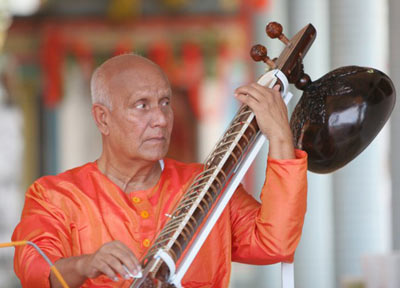

Sri Chinmoy began learning traditional Indian songs during his Ashram days, he learnt many songs by Tagore, Ramprasad; songs he still enjoys today. It was also in the Sri Aurobindo ashram where he took singing lessons, enabling him to develop his voice. Sri Chinmoy also had the good fortune to live near the renowned singer of Dillip Kumar Roy, Dillip was held in the highest regard in India as one of the most beautiful singers, with a golden voice.
Sri Chinmoy began composing songs during his youth but it was during his time in the West that he emerged as one of the most prolific composers of devotional songs. In 2005 Sri Chinmoy had composed nearly 12,700 Bengali songs, 7,000 English songs, 180 Sanskrit and 33 in French. There is a strong connection between the poetry of Sri Chinmoy and his music. In the early 1970s many of his longer poems, some of which are featured in the collection “My Flute”, were set to devotional music, giving an extra dimension to the poetry of Sri Chinmoy.
Many of Sri Chinmoy’s early poems embodied a feeling of hopelessness and helplessness. They are poetic reflections of Sri Chinmoy’s empathy with seekers who pass through experiences of suffering and struggle. By setting these poems to music they give the poems an additional dimension, embodying the sweetness and pathos of a seeker. See Sri Chinmoy Songs.
Sri Chinmoy says that the songs he composes come from within. He hears the music as a continuous flow, often it is not clear where one song begins another ends. On one day Sri Chinmoy composed 300 songs, an illustration of his spontaneous creativity which comes from his heart.
In the traditional style Sri Chinmoy likes to teach the songs directly to his students as the song is composed. Sri Chinmoy does not write the music down but often sings the new song. Then an experienced group of singers sing the song until they have grasped the correct rhythm and innotation. The music is then transformed to a conventional music sheet.
Sri Chinmoy has composed songs about a large array of spiritual topics, his songs become an extension of his spiritual philosophy, encapsulated in a relatively short song lyric. Sri Chinmoy’s song vary from his epic song Dhulok Chariye to those which embody shortness and sweetness. A favourite song of Sri Chinmoy is
“My gratitude-heart is all that matters.” A short and simple encapsulation of Sri Chinmoy’s spiritual philosophy which emphases the power of the heart.
Sri Chinmoy feels music is an excellent method to create a meditative consciousness. Sri Chinmoy says of music.
“Spiritual music helps the seeker to dive deep within
To get the highest satisfaction from life, from truth, from reality.”
- Sri Chinmoy (1)
Excerpt from God the Supreme Musician:
Sri Chinmoy prefers the simple melodic line, without any undue complications. This makes his music accessible to most people with a little musical background. Sri Chinmoy also feels that the simplicity and purity of such songs are the most effective for the upliftment of the performer and listener. Within Sri Chinmoy’s 17,000 songs there are no 2 that are alike each song embodies a variety in either melody, rhythmn, tone or sentiment. Sri Chinmoy’s musical creativity has united the lyrical devotional tradition of India with the power, speed, and vastness of the dynamic West. His music has achieved praise from many noted musicians.
“What music I hear! Beautiful… My musical spirit is very,very deeply impressed.” (1) - Leonard Bernstein (The Source of Music ISBN: --994997-575-4)
(1) God The Supreme Musician by Sri Chinmoy
Music and Meditation Talk by Sri Chinmoy